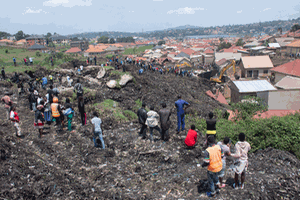Prime
A tale of tears and fear at Mulago hospital

Relatives wait to hear the fate of their loved ones at Mulago hospital on Sunday. About 31 people are said to have died in Saturday’s fuel explosion. Photo by Abubaker Lubowa
Kampala- Streams of tears, ear-deafening wails, clouds of emotion, uncertainty and excruciating pain was the atmosphere that engulfed Mulago hospital yesterday as relatives and victims came to terms with the gruesome fuel tank accident at Namungoona, on the Northern By-pass.
At the causality ward, 3B, commotion and uncertainty characterised the corridors as women and children sat on the floor, the men struggling to catch a glimpse of the patients’ list.
Of the 24 burns victims admitted, 22 were male and two female. The sight of names on the list stirred mixed feelings - excitement for those whose relatives made it to the survivors’ list and uncertainty for others, whose attention focused on those wheeled to the mortuary.
Attempts by hospital staff to block them from accessing the surgery section for a status update were received with outright hostility.
A few metres from the surgery room, gasping for breath on a blood-stained mobile hospital bed was Charles Kasule of Bweyogerere. His upper body had no trace of a burn. He lay on the bed naked, with only a piece of cloth to cover his genital area. Onlookers sighed at the sight of his thighs, legs and feet reduced to pale red flesh with layers of scattered dark skin.
The 23-year-old boda boda rider stares at himself with infectious emotion, tears rolling down his eyes as he struggles to share his survival story.
“I was taking a passenger to Namungoona and found myself in the middle of the fire. I fell off the motorcycle into the water,” Kasule narrates, his gaze fixed at his swollen chest before he looks at the ceiling and adds in a strained-soprano voice: “My passenger died, I am told. I am humbled that God saved me.”
Unlike Kasule’s relatives, who are standing by him, others are left in horrifying suspense as they are not sure of their relatives’ fate. Even as doctors dash from door to door, making phone calls and consulting each other, these relatives try to stop them for permission to physically check out the patients in the wards.
At the mortuary, wailing and silent tears followed the confirmation of names.
For others there was a fear to take a look at the list, let alone speak to the Criminal Investigations and Intelligence Department staff taking statements before bodies are handed over to family members.
One of those is Irene Namutebi whose 16-year-old brother Samson Nduga, she tearfully explains, “left home at 2pm, he did not tell us where he was going. The next we heard was a phone call from his friend, who told us at 9pm that he had died in the accident.” Namutebi is lucky to be sure of her brother’s status because she will not have to wait for DNA results as some victims were burnt beyond recognition.
She has also been saved the hustle of having to dash every time a police patrol truck brings in bodies to find out if it is her loved one.




